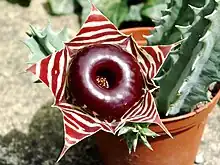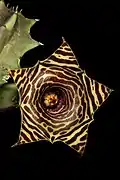| Huernia zebrina | |
|---|---|
 | |
| The flower emits a carrion odor to attract flies | |
| Scientific classification | |
| Kingdom: | Plantae |
| Clade: | Tracheophytes |
| Clade: | Angiosperms |
| Clade: | Eudicots |
| Clade: | Asterids |
| Order: | Gentianales |
| Family: | Apocynaceae |
| Genus: | Huernia |
| Species: | H. zebrina |
| Binomial name | |
| Huernia zebrina | |
| Synonyms[1] | |
|
List
| |
Huernia zebrina, the little owl, also called lifesaver cactus, is a species of flowering plant in the family Apocynaceae, native to Namibia, Botswana, northern South Africa, Zimbabwe, and Mozambique.[1] A succulent, it has gained the Royal Horticultural Society's Award of Garden Merit.[2]
Subtaxa
The following subspecies are accepted:[1]
- Huernia zebrina subsp. insigniflora (C.A.Maass) Bruyns
- Huernia zebrina subsp. zebrina
 Huernia zebrina subsp. zebrina
Huernia zebrina subsp. zebrina
References
- 1 2 3 "Huernia zebrina N.E.Br". Plants of the World Online. Board of Trustees of the Royal Botanic Gardens, Kew. Retrieved 4 April 2021.
- ↑ "Huernia zebrina little owl". The Royal Horticultural Society. Retrieved 4 April 2021.
Other common names; ... owl eyes
This article is issued from Wikipedia. The text is licensed under Creative Commons - Attribution - Sharealike. Additional terms may apply for the media files.